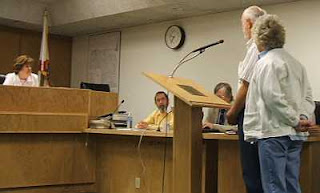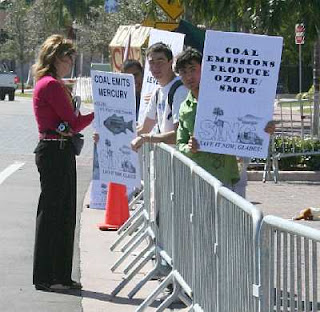$5 Million Awarded To Local Companies
LABELLE, FL. -- Lt. Governor Jeff Kottkamp this week joined Florida Commissioner of Agriculture Chares H. Bronson and the Florida Department of Environmental Protection (DEP) Secretary Michael W. Sole to announce the recipients of Florida’s renewable energy technologies grants. Included in the eight grants were two from Hendry county who both received the maximum grant allowed, $2.5 million. The companies will put an additional $34.3 million into the two local projects.
The Renewable Energy Technologies Grant Program recipients for 2007 in Hendry County were:
Citrus Energy LLC, “Fuel Ethanol Production from Citrus Waste Biomass” ($2.5 million): "Based in Clewiston," according to a press release from the State of Florida, the company will supposedly construct a four-million-gallon-per-year ethanol bio-refinery to use citrus waste to produce ethanol reportedly co-located with Southern Gardens citrus processing plant west of Clewiston. Southern Gardens ( a subsidiary of U.S. Sugar) will design and operate the plant. This project will when completed transform citrus waste, in what the press release says is "an abundant agricultural residual, into a clean, affordable and locally-produced biofuel." Citrus Energy, a new company was incorporated in Boca Raton in June 2006 by David A. Stewart and his wife Lesley A. Stewart of Boca Raton, Fl. The Stewart's have six children.
The company, under the state grant money program, is claiming to bring $7.5 million of their own money to the project. It would appear from released information that Stewart may be planning on more government inducements to help get funds and incentives for the company.
The new firm's website says they have former Florida House of Representative, Florida Senator, consultant and attorney Ron Silver onboard. Also noted are direct marketing and internet based marketer Aaron Hollander, and lawyer Ronald L. Book, president of a law firm "considered one of the premier lobbying firms in the state...with experience in the appropriations process."
David Stewart's biography says he has three patents pending: Ethanol Production From Citrus Processing Waste; Method And Apparatus For Vacuum Cooling Of High Solids Slurries; and Method And System Of Treating Citrus Waste To Remove Peel Oil Components. It also says he built a pilot scale plant on USDA premises to process 1,000 gallon batches of citrus waste and then built a demonstration scale plant at a Citrus Processor’s premises which processed 10,000 gallon batches of citrus waste.
Alico Inc., “Commercial Ethanol Production from Biomass” ($2.5 million): The project will use biomass products to co-produce ethanol and electricity at a savings for consumers. The facility will produce ethanol for blending with gasoline at less than one-third of the current national average retail cost of gasoline, and can deliver “green” electricity at a cost of five to eight cents per kilowatt hour. Alico is a many decades old company with wide interests in real estate, agriculture, and land holdings based in LaBelle.
Alico is pledging under the grant program to use $26.8 million of their money for the project. Alico says they will build a 7.7 million gallons per year ethanol plant using technology from Bioengineering Resources, Inc. of Fayetteville, Arkansas who builds modular ethanol facilities.
Through the 2006 Florida Energy Act, the Florida Legislature appropriated $15 million for renewable energy technologies grants to stimulate capital investment in the state and promote and enhance the statewide utilization of renewable energy technologies, including ethanol and bioenergy.
The funding was awarded to eight organizations with at least $5 million to support bioenergy projects and $10 million for projects that generate or utilize other renewable energy resources, including hydrogen, biomass and solar energy.
“This is a major step forward in Florida’s effort to establish a meaningful renewable energy industry,” Commissioner Bronson said. “We hope to build on this first step with the help and support of our industry, our colleagues at DEP, the legislature and Governor Crist.”
The targeted grant program is designed to advance the already growing establishment of renewable energy technologies in the state, including hydrogen, biomass, solar energy, geothermal energy, wind energy, ocean energy, waste heat and hydroelectric power. The eight grant recipients were selected from among 183 grant proposals seeking nearly $215 million in grant funding and providing more than $505 million in cost share for renewable energy projects.
Grant proposals were evaluated by the state based on a number of different criterion, including cost share percentage, economic development potential, energy efficiency and how the project fosters public awareness of renewable energy technologies. Grants were awarded at a maximum of $2.5 million per project, and eligible applicants included Florida municipalities and county governments, established for-profit companies licensed to do business in Florida, universities and colleges in the state, utilities located and operating within Florida, not-for-profit organizations and state agencies.




